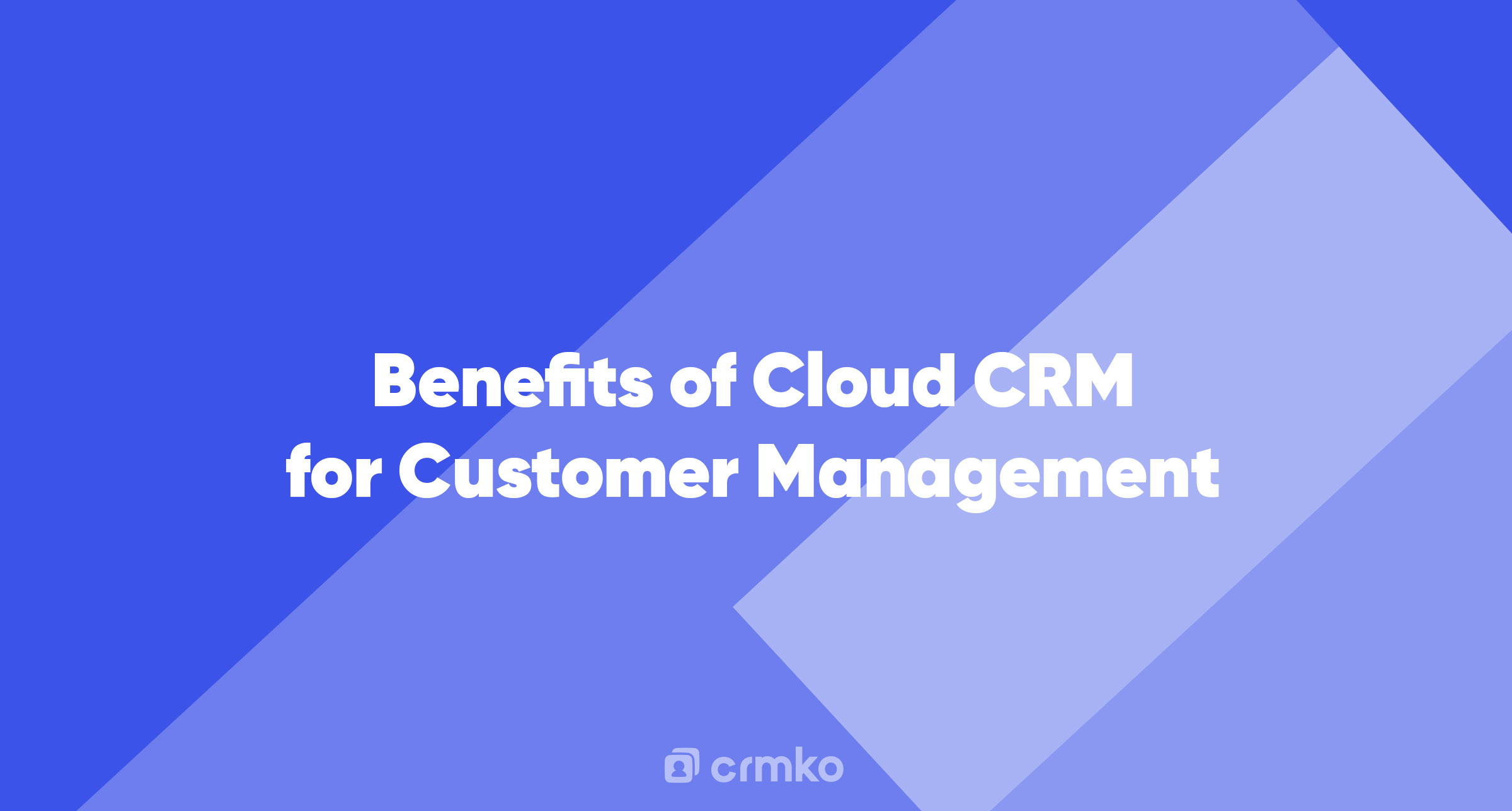In today's digital age, organizations are increasingly relying on technological solutions to manage their customer relationships. Among these solutions, Cloud CRM (Customer Relationship Management) systems have emerged as a game-changer. By offering a plethora of benefits, these Cloud-based tools are revolutionizing the way businesses interact with their customers. In this comprehensive guide, we delve into the benefits of cloud CRM for customer management and how it has become an indispensable asset for businesses of all sizes.
Cloud CRM: A Brief Introduction
Cloud CRM, also known as Software-as-a-Service (SaaS) CRM, is a web-based software solution that centralizes customer data and automates customer interaction processes. Unlike traditional on-premise CRM systems, cloud CRM is hosted on the provider's servers and accessed through the internet, removing the need for businesses to invest in hardware or software maintenance.
One of the critical features of cloud CRM is its scalability. This means that the system can adapt to the changing needs of a business, allowing for expansion or reduction of functionalities as required. This flexibility, alongside other benefits such as cost-effectiveness, ease of use, and high-security levels, makes cloud CRM a preferred choice for many organizations.
Exploring the Benefits of Cloud CRM
1. Cost-Effective and Affordable
One of the most compelling benefits of cloud CRM is its affordability. Unlike on-premise CRM systems that require hefty upfront investments in hardware, software, and IT personnel, cloud CRM operates on a subscription-based model. Businesses can choose a plan that suits their needs and budget, with the option to scale up or down as required. This model not only reduces initial investment costs but also minimizes ongoing maintenance expenses.
2. Easy Installation and Use
Cloud CRM systems are renowned for their ease of installation and use. With no hardware to set up or software to install, businesses can get their cloud CRM system up and running in no time. Moreover, most cloud CRM providers offer intuitive user interfaces and comprehensive training materials, ensuring users can quickly become proficient in using the system.
3. Unparalleled Accessibility
With cloud CRM, businesses can access customer data and manage customer interactions anytime, anywhere. All that's required is an internet connection. This 24/7 accessibility is particularly beneficial for businesses with remote or mobile workforces, as it enables employees to stay connected and productive regardless of their location.
4. Scalability and Flexibility
Cloud CRM systems offer unparalleled scalability and flexibility. As businesses grow and evolve, their CRM needs often change. With cloud CRM, businesses can easily add or remove users, increase storage capacity, or upgrade to a plan with more advanced features. This flexibility ensures that the CRM system can adapt to the changing needs of the business, facilitating continuous growth and development.
5. Robust Security
Despite common misconceptions, cloud CRM systems offer robust security measures to protect sensitive customer data. These measures often include data encryption, two-factor authentication, access controls, and regular security audits. Additionally, cloud CRM providers typically offer automatic data backup services, ensuring data can be quickly recovered in the event of a system failure or data loss incident.
6. Seamless Integration
Cloud CRM systems are designed to seamlessly integrate with other business applications, from email systems to social media platforms. This integration capability allows businesses to centralize their customer data and streamline their customer management processes. Additionally, it eliminates the need for manual data entry and reduces the risk of data errors, improving data accuracy and reliability.
7. Real-Time Updates and Automatic Upgrades
With cloud CRM, businesses can enjoy real-time updates and automatic upgrades. This means that they always have access to the latest features and functionalities, without having to worry about manual updates or system downtime. Additionally, real-time updates enable businesses to respond quickly to changes in customer behavior or market trends, enhancing their decision-making capabilities.
8. Data Analytics and Reporting
Most cloud CRM systems come with built-in data analytics and reporting tools. These tools can analyze customer data to uncover trends, patterns, and insights, helping businesses make data-driven decisions and strategies. Additionally, they can generate detailed reports on various customer metrics, such as purchase history, engagement levels, and customer satisfaction, providing businesses with a holistic view of their customer relationships.
9. Improved Customer Service
By centralizing customer data and automating customer interactions, cloud CRM can significantly improve customer service. It ensures that customer service representatives have access to up-to-date and accurate customer information, enabling them to provide personalized and efficient service. Additionally, it can automate various customer service tasks, such as ticket tracking and resolution, reducing response times and enhancing customer satisfaction.
10. Enhanced Collaboration
Cloud CRM facilitates collaboration by providing a centralized platform for sharing customer data and insights. This ensures that all team members, from sales and marketing to customer service, have access to the same information, promoting consistency and synergy in customer interactions. Additionally, it enables teams to collaborate on customer strategies and campaigns, improving their effectiveness and efficiency.
Wrapping Up
In conclusion, the benefits of cloud CRM are manifold, spanning from cost-effectiveness and ease of use to robust security and real-time updates. By leveraging these benefits, businesses can enhance their customer management capabilities, improve customer service, and ultimately drive business growth. Regardless of their size or industry, any business aiming to build strong, lasting relationships with their customers would do well to consider implementing a cloud CRM system.
